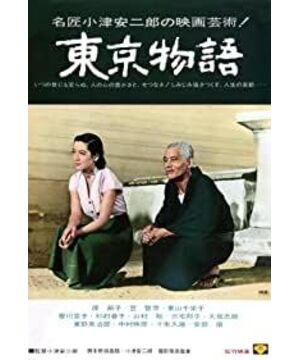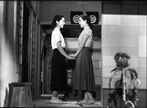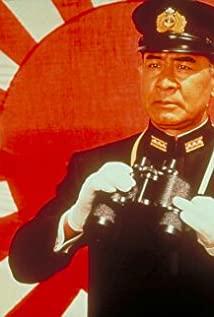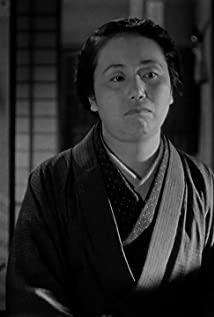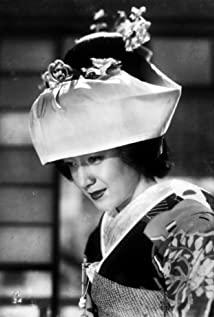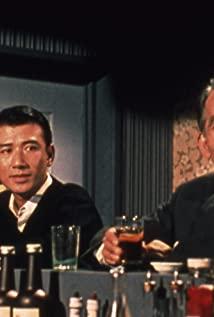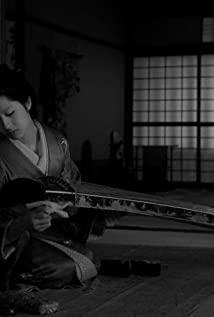There is such an "ideal" family in "Tokyo Story", but he is the saddest and most memorable one in Ozu's movies ("Tokyo Twilight" is an exception, and the crippled family is exacerbated by the fact that it has no universal significance). Even the music outside the painting is always melancholy and melancholy, no longer the briskness that Ozu loves to use. This is undoubtedly a "last words" film, but it was shot in the middle of Ozu's prosperous period of creation. From this film, Ozu's style took a turning point. It was easy and humorous to reach the bottom of sorrow, and then gradually relieved and laid the end." "Sorrow but not hurt" tone.
In "Mai Qiu" in 1951, there was a family of three generations of the same age as in "Tokyo Story". That was the perfect example of family situation in Ozu's mind. Two years later, Ozu used the same family structure to describe family life. The other side, those helpless, hurt, but the side we have to bear. Human nature is not always good, but any kind of human nature, as long as it is not extremely evil, is excusable. This is Ozu's answer to modern society and how people face the traditional disintegration process. Ozu said: "I want to describe how the traditional Japanese family fell apart through the experience of parents and children."
"Tokyo Story" is also Wenders's favorite Ozu movie. In 1982, he chose this film at a screening in Rome, as a work that has a special influence on his film work, and triggered the shooting of his own version. The idea of "Tokyo Story". In the second year, he really embarked on a journey to Japan and made the famous "Looking for Ozu". The beginning and end of this documentary are nothing else but the opening and ending of "Tokyo Monogatari". Wenders used this A unique way to pay tribute to the senior directors he admired, and to pay tribute to the films he likes.
So, let’s start from the beginning: Father Zhou Ji and mother are going to Tokyo to visit their children, and the neighbors came in to greet them, you are so lucky, your children are so promising. The old couple smiled modestly and said, where and where.
This is a lucky family that was basically preserved in the war. The most difficult period has passed, and the happiness of family is here. The eldest son Koichi worked as a doctor in Tokyo, and his second daughter Shigeru opened a beauty shop in Tokyo. Although the second son Masuji passed away eight years ago, his second daughter-in-law Kiko is still single and is very filial to them, except for the little daughter Kyoko who stayed at home to accompany them. There are three sons Keizo in Osaka. At a bright beginning, the sails fluttered, looking forward and a little bit eager. The children are all grown up, and they have married each other, and their parents are getting old. Taking advantage of this old bone is still walking, and if you don't go to Tokyo to see it, I'm afraid there will be no chance in the future. The old couple went on the road with such a mood.
But the actual situation is that before they arrived at the eldest son's house, the grandson was crying because his grandparents came to make room, and his mother moved his desk to the aisle. The embarrassing situation of the old man who is too big and improper and gets in the way everywhere has first appeared.
Tokyo is a huge, busy, and assembly-line city. The fast-paced life is like a pedestrian who bows his head and keeps his head on the road. If you hesitate for a while, you may block someone's way and attract impatient eyes. In the film, the husband once said that Tokyo is really big. The wife replied, yes, if you are separated, you may never see you again in your life. Dao makes all the old people confused and at a loss in the face of an unfamiliar environment.
The old people can't figure out where they are, or the location of their children's homes, and they are as weak as children in front of the maze-like city. It's not much better at the children's house: the elder son is busy with work and has no time to take them out to play. When I moved to my daughter’s house, I was still trapped on the second floor every day. Sometimes I went to the small terrace on the third floor to breathe and bask in the sun. The old couple gradually understood the situation of their children, just as the husband said to his old friend: Tokyo is too big, and it is not easy to get ahead. Except for the second daughter-in-law, Kiko, who took time off to accompany them out for a day of fun, the old man had never been anywhere in Tokyo. Everyone was exhausted under the weight of their own lives, and they were too busy. The children decided to pool together money to send their parents to the hot sea hot springs.
The noise of the whole night in the cheap hotel, through the thin walls, bursts of irritation, the two old people toss and turn, and it is difficult to sleep. The next day, on the quiet beach, the couple asked and answered:
Husband: This is the place where young people come.
Wife: Yes.
Husband: I've visited Tokyo, and Atami has been there again. Let's go back.
Wife: Go home.
I didn't want to be complained by my daughter as soon as I returned to my daughter's Fan's house and asked them why they didn't stay for two more days. There was a lecture and rally at home that happened on the same day. It was her turn to preside and there would be a lot of people. The two old men discussed what to do. The husband decided to let his wife go to Kiko’s place to make peace for one night and find an old friend by himself. It would be best if he could stay overnight. But it was the afternoon, and Kiko hadn't got off work yet, so the couple had to go to Ueno Park to pass the time. The husband smiled and said: Finally homeless. The wife smiled helplessly: Yes.
Don't visit friends purposefully, will you be extra guilty? Although the old man looks as usual, I feel for no reason that he is like a frightened bird. Every family has hard-to-read scriptures, and old friends who have moved to Tokyo from their hometowns have a bad time. The two sons of the family died in battle, and the remaining couple rented out the family house to barely make a living and pass their dying years; the family had only one son, vain and low self-esteem, under the squeeze of the huge shadow of the city, the children might be afraid There is not much leisure left to care for the elderly and appease a lost heart. The three old friends had nowhere to go, so they had to spend their time in the tavern and find a temporary "safe place". Everyone, you and I are talking about your depression and troubles. One of them concluded: "You will be lonely if you don't have a child, and you will be lonely if you have a child, neither is good." This paragraph is the most worrying!
Sato Tadao once pointed out that Ozu has a moral view: "Don't be too coquettish to those who allow yourself to be coquettish." This sounds a bit "windy", but it actually means restraint and patience. According to the older brother's words in "Mai Qiu", it means not to trouble or embarrass others. This patience does not just give in, but contains a heart for the sake of the other person. No matter when you don't indulge yourself, you'd rather be kind than hurt your feelings. This is what an Eastern concept of handling things. It is from this concept that the old couple pays attention to them everywhere in their children's homes, and is always careful. I remembered a sentence from my ex-grandpa: It’s boring to live for a long time. My grandfather often chanted this sentence during his lifetime and resolutely rejected the mother’s plea for him to live longer, leaving an old and stubborn impression on me when I was young. I now understand that it contains old-school self-esteem, generosity, and tolerance. And considerate.
The "attempt" to spend the night in a tavern failed. The father, who had been abstinent for many years, was drunk and was sent home by the police station. He also brought an inexplicable friend. His daughter Fan was very angry and kept complaining. . On the other hand, the wife is well taken care of by the daughter-in-law. The old man relaxes in the cramped space and sighs sincerely, "This day is really long. I came back from Atami, went to Fan's house, went out again, and finally came here. It was my happiest day in Tokyo." With that said, the old man cried with mixed feelings.
The next day, the old couple embarked on the road back home, as if they had been harassing for a long time, but in fact it was only ten days. The son said: You have gone everywhere this trip; the old man smiled and said: Yes, there is no regret. The daughter did not forget to mention the stubble of the previous night: father is not allowed to drink like this in the future! The father replied with a good temper: I have been taught a lesson. The mother said as if foreseeing something: You are all busy, you have seen it this time, if something happens, you don't have to go back specially.
In a word, the mother was critically ill when she returned to her hometown, and the children who had just bid farewell rushed back, and her mother passed away peacefully. Life was hard when she was young, and her husband was absurd; when she was in her middle age, the war was chaotic and the pain of losing her child; in her later years, her children were cold and lonely, and life’s ups and downs were gone. Like all the sorrows and worries, she found a safe place to put her aside. You can rest assured.
During the whole process, the father just unconsciously repeated the words of his children: Really? Is she dying? Yeah? She went? Li Zhizhong was "good at" muttering to himself like this, but this time he was particularly sad and peaceful. The loneliness, frustration, frustration, and misery of life, one by one, will be a death not far away. Therefore, death is not so sad, nor as terrible as imagined. Step by step, life perceives it, becomes familiar with its smell, and is finally subdued by it (or life can finally subdue death), they finally Melt into one. The life that has been relieved of the burden of life lightly sinks into the void of death, with happy memories, and is not hindered by the mundane ever since.
After finishing the mother's funeral, the children left in a hurry. Only the second daughter-in-law, Kiko, stayed for a few more days. The sharp contrast is easy to think of some kind of advocacy and stigmatization about filial piety and unfilial piety, but Ozu has no intention of this. He just wants to acknowledge the impermanence of reality and understand the frustration of life; while trying to keep his own world clean and comprehensive, he is also unkind to others. The overwhelming, impetuous, light-hearted.
The old couple who smiled throughout the film only complained that their children have grown up and changed. The eldest son was originally very kind, and the second daughter was very gentle when he was young. But when the conversation changed, they sighed like the old man in "Mai Qiu": "In any case, we are still happy." "Yes, we are very happy."
It was the little daughter who expressed Ozu's attitude more clearly . When Kyoko questioned the relatives' selfishness at the end of the film, he had a conversation with Kiko, played by Setsuko Hara:
Kiko: I thought the same way when you were your age. But when children grow up, they will always leave their parents and have their own lives. They are not doing this with bad intentions. Everyone will put their own lives first.
Kyoko: Maybe it is. But I don't want to be like that, it's too cold.
Noriko: Maybe it is, but everyone will be like this, and it will change over time.
Kyoko: You too?
Noriko: Yes, I don't want to change, but it will become like that.
Kyoko: Life is really disappointing.
Noriko: Yes, there are too many unsatisfactory things.
Calmly watch, time goes by, family love is separated, and life disappears. Do not complain, do not seek, in the warm background suddenly a trace of the coolness of life. The world of Ozu movies is like this.
He has never set high expectations and demands on human nature, but he has never lost faith in the goodness of human nature itself. The second daughter-in-law Kiko in "Tokyo Story" probably represents the ideal female image in Ozu's mind: beautiful, virtuous, restrained, filial, strong, and sincere. . . There are so many shining points on her body that she is about to "deify", but after all, Ozu is nostalgic for the warm smell of fireworks in the world, not the unattainable paradise temple. At the end of the film, the scene where Settsuko Hara hides her face in front of Tomomi Kasagi and weeps is a crack: "I'm not a good person... I'm very cunning, and I don't always miss Changji like my parents thought."
The collapse of patience just proved it. The freshness of a person. Humans are emotional animals, they can be shaken, scared, hesitant, and disappointed. Everyone is the same. Kiko, who lives alone, has been with her loneliness for eight years. Perhaps because of this, she saw the loss and injury hidden behind the smiles of the two elders. Kiko's confession freed her from her pale perfection and restored the abundance of human contradictions. In this way, two more things can be added to her many advantages: introspection and frankness.
People always say that Ozu is unmarried all his life, how to understand the various aspects of family life like this, I suddenly understood a little bit, just like Kiko, I feel the same. Or perhaps, it is precisely because Ozu can escape from the mundane affairs of specific life that he will not be fascinated by the authorities; it is precisely because he can see the world from a point where rationality and sensibility match properly, and then the observers can see clearly. It is not surprising that the "Tokyo Story", which is about the ups and downs of the human world and does not describe the injury, was born from such an Ozu.
There are two scenes in the film that are particularly worth remembering: one is the second elder who just arrived in Tokyo, and the eldest son had planned to take them out for a tour, but they were all ready to go, but he cancelled the plan for a temporary visit. The husband who had changed his usual attire sat in front of the window and saw two figures, one tall and one short, in the distance. It was his wife and his grandson playing by the highway bridge. The angle of view is very plain, but for no reason I feel the charm is long and endless, and an unspeakable loneliness surges to my heart, my eyes can't help but wet.
The other was at Atami Beach. After the two elders made the decision to go home, the husband got up first, followed by his wife. He did not stand up and fell on his feet. The husband asked, what's wrong? The wife replied, I don't know, maybe I didn't sleep well last night. How helpless and sensible are two old people who don't want to trouble others but try their best to endure them. It seems inappropriate to use the word "sensible", but the moment when the old man fell slumped, he was really as weak as a child. After the camera opened, two figures in front and one back reminded me of Sasuke and Harukon in Junichiro Tanizaki's "Harukin Sho": Sasuke who loved Harukon for his whole life was humble, even if he was finally buried with Harukon after his death, his grave It is also a little behind, like the humble little student before his death, always supporting his master, his lover Chunqin, at a later position. In this film, it is the reverse, with the husband walking in front and the wife following behind. Shiyun: Hold the hand of the son, and carry the old with the son. I thought: Actually, you can grow old together without holding your own hands.
In the same space, there is one less figure sitting on the top of the tatami mat. The neighbor who passed by the window came to greet again: "I didn't expect that so many things have happened, you have to take care." Husband Zhou Ji smiled and replied, "Yes. Living alone, I feel that every day is very long."
"It's really lonely to be a human being."-This is the answer from the neighbor, and the old man's heart.
"Converge lightly to regain the road, look at the sunset and sigh", the outside world is constantly flowing, and the corner of the house is only a single figure. Time is passing, life is changing, memories are eternal. The bells are getting louder and louder, but we can only hear them when we retreat into the deepest part of our hearts.
View more about Tokyo Story reviews


